Daesh executes five civilian rescuers in Iraq: Local TV


Daesh has reportedly executed five individuals who had been helping civilians in Iraq flee the areas controlled by the Takfiri terrorist group.
Iraq’s Alhurra television channel reported the atrocity on Saturday, saying the group had confirmed the executions — which had been carried out at unknown locations — by circulating related images across social networks.
Separately, the Iraqi Joint Operations Command, which supervises operation of military and volunteer forces, was cited by the country’s Alforatnews agency as reporting the elimination of 16 Daesh operatives in the north-central provinces of Salahuddin and Kirkuk on Friday.
The fatalities included the so-called “governors” assigned by the terror group to the respective provinces.
The northern and western parts of Iraq have been plagued by gruesome violence ever since Daesh terrorists mounted their offensive in June 2014.
Iraqi forces secured their most-resounding victory yet against Daesh last December by liberating Ramadi, the capital of the sprawling western Anbar Province.
The group also has a presence in neighboring Syria, where Syrian government forces are pushing it out of much of the areas it has overrun.
Security forces in Syria and Iraq are closing in on the cities of Raqqa and Mosul, Daesh’s so-called headquarters in the respective countries.







